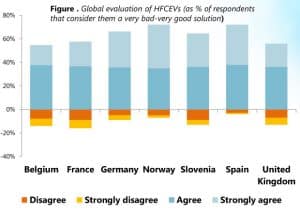
The acceptance of a new technology is a decisive factor for its successful implementation: A lack of support by important stakeholders – for example, from politics and industry – and the public could delay or even halt development. The HYACINTH project uses a very broad definition of market acceptance in the sense of the technology being embedded into and accepted by society. This means that in addition to the opinions of ordinary citizens, the study considered the viewpoints of others who play a vital role in innovation, such as people from research, business and politics. The analysis of the current situation included not only questions to 7,148 members of the general public, but also 333 stakeholders of the hydrogen industry. The findings from the latest survey have been the basis for developing the Social Acceptance Management Toolbox (SAMT), which is thought to support stakeholders in furthering the social acceptance of H2 technologies.
Surveys among experts and the public
Market research agency Norstat asked people who were 16 years or older and lived in one of seven European countries (Belgium, France, Germany, Norway, Slovenia, Spain and the UK) to fill in an online questionnaire about the topic. At the same time, interviews were conducted with experts from five of the countries (France, Germany, Spain, Slovenia and the UK). The target group of the latter were experts on energy and hydrogen (see table 1).
Whereas the number of private citizens surveyed was about the same in all countries, the figure varied in the case of asking for expert opinions. Some of the difference could be attributed to the size of the country or the local H2 community. For example, the sample size in Slovenia was very small, which means that the reliability of this country’s results was limited …


























0 Comments